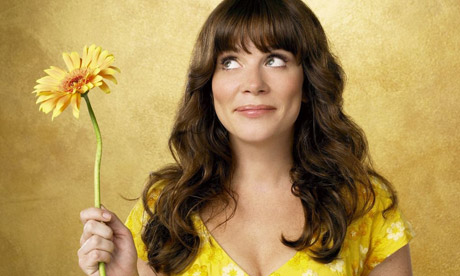 |
| Bryan Fuller (source: IMDB) |
You know “that guy”? Yeah! Him! Everybody has that one actor in film and TV that just pops up everywhere but you never know his name or remember what you saw him in. Now, what if “that guy” was not an actor but a television creator, writer and producer? Now, imagine that the same individual was responsible for some of the best television shows of the last fifteen years. Yeah. That’s Bryan Fuller.
The closest point of comparison to Fuller I can make is a somewhat more whimsical version of Joss Whedon, the creator of TV’s Buffy the Vampire Slayer, Firefly and, most recently, the director of Marvel’s The Avengers movies. Like Whedon, Fuller has a knack for writing captivating characters in unique situations and he excels at dialogue. For a big-budget Hollywood movie, sometimes just dangling keys is enough to be entertaining, but having to operate on a limited budget for a TV show spanning a broader length in terms of story is much more difficult, especially when you are trying to sell an audience something so strange as to be occasionally unsettling.
A characteristic of Bryan Fuller’s series that I actually kind of like is his somewhat light approach to the dark topic of death. Almost all of his shows have some darker undertone superimposed on bright or humorous backdrop. This goes especially for his “big four” as I like to call them, but we’ll get to those in a moment. First, it is important to know that Fuller does not have many credits to his name, and that is often a positive sign… No, really. Granted, he has only been active in the industry since the late 90’s, so it stands to reason his career thus far would be barely impactful… right..?
Well, it really starts in 2000 with his work as a writer and producer on the spinoff series Star Trek Voyager. I am not really a Star Trek fan, per se. I have recently gotten into The Next Generation, watching episodes here and there, and liked what I’ve seen so far, but I have not watched Voyager, so I cannot really give any personal opinion on that one show, still, for an up-and-comer, landing such a position on such a storied franchise is very, very impressive. The question is: Does he prove himself worthy of gaining such a credit early on in his career?
 |
| Dead Like Me (Showtime; source: Pintrest) |
The first of the “Big Four” is 2001’s Dead Like Me, one of my favorite shows of all time and one of the most criminally short-lived shows in the history of television (both will be running themes here). The series follows an apathetic teenager who died suddenly in an accident on her first day of work, only to be kicked back from the afterlife to the undead, tasked with becoming a Reaper. She is then forced in with a crew of fellow veterans of the Reaper title who seemed to be trapped in limbo as she carries out her duties, ferrying souls to the afterlife. It’s definitely a dark series but, in spite of its themes, it’s a comedy, and a damn-funny one at that. It’s defined by its uniquely sardonic take on death, while still dealing honestly with the effects of loss, especially on the family and how they are unwittingly watched over by a daughter who only felt unappreciated before her passing. It’s comically-grim, yet occasionally moving, and if you haven’t seen it, I give it my strongest recommendation.
 |
| Wonderfalls (2004; Fox) |
Now, on that note, “Big Four” entry numero dos is Wonderfalls. This is the first show that would really begin to highlight Fuller’s curse as a producer of hitting the right note but never maintaining a series beyond a few seasons. This series ALSO followed an apathetic young lead, this time a worker at a gift shop for a Niagara Falls tourist trap. The cyclical girl begins to have strange hallucinations of anthropomorphic objects (sculptures and the like) around her place of employment appearing to come to life, giving her one-word clues to… something. When she discovers what that ‘something’ is, it becomes clear that as insignificant as she may have felt at first, she really does serve a greater purpose. Wonderfalls is a strange show filled with many of the quirks that made Dead Like Me so damn enjoyable. The writing is good, the characters are fleshed out naturally and never feel superfluous and the performances are all excellent. Sadly, this great series lasted only a handful of episodes before its ultimate cancellation, and I have only the simplest explanation as to why it didn’t really last: bad timing. It came up against the NBA games for the first third of its run, then Fox did what they do best, stopping the show dead in its tracks in favor of American Idol. After only four episodes, the show was forced into a three month hiatus, followed by another Fall hiatus that same year. The entire season (which was only 13 episodes) took ten-and-a-half months to complete. It never stood a chance.
This was a big problem in the mid-2000’s. The culture-killing Writers Strike of 2001 left many producers cold and bitter and what came out of that was an unfortunate and disastrous takeover of reality television. Since these shows were cheap to produce, required zero support from the Writer’s Guild of America and proved to be quite successful, most shows that ran in the early 2000’s were just cut off in favor of the cheaper alternative. This is why there was this massive sudden influx of dreadful reality TV that lasted for nearly a decade, with most networks only coming out of this Hellish slump in the last five-to-six years. During this period, Fox’s American Idol was an audience-stealer and, as a result of this, the network would preempt entire series in favor of this one show, airing it as much as five nights a week in some periods, during which they rarely offered any show alternatives. It was because of this decision that many cable networks began to rise up with their own original primetime programming, eventually taking over a majority of the prime time slots ever since. I’m sure, at this point, in-spite of Idol’s success, Fox is sort of kicking themselves for driving out their audience. Dead Like Me, Firefly and the excellent Freaks and Geeks were just a handful of shows killed by the WGA strike, the latter two of the three’s demise being helped along oh-so-handily by Fox executives..
 |
| Pushing Daisies (2007; ABC) |
However, even after the unfortunate passing of Wonderfalls, Fuller was not deterred. In 2007, Pushing Daisies premiered, this time on ABC. This was a strange show. It was honestly unlike anything else on television. It had this whimsical tone, filled with wide-angle lenses, Douglas Adams-esque narration, odd undertones of death and sex and the occasional musical number, all set to a super-polished Americana theme peppered with very bright colors. The series followed the Piemaker, Ned, who discovered as a boy that he had the power to bring the dead back to life with a touch, but only for a few seconds. He learned tragically that if he did not touch the resurrected again, something (or someone) nearby will die in their stead. So naturally, as an adult, an intrepid P.I. is there to exploit his powers to talk to the dead to solve mysteries. Nope. Not kidding. They go on adventures and everything, and as funny as that sounds, there is a strong sense of tragedy surrounding the entire show. His best friend, the love of his life, and one of his few true friends dies and his choice to raise her from the dead for good leads to more than a few complications. Aside from someone else dying for her to live, there is the sad reality that he can never touch her. There is a heartbreaking poetry in this idea, and it is presented nearly flawlessly in Pushing Daisies. Also, like much of his work to this point, this series revolved heavily around death.
Pushing Daisies is, by-far, Fuller’s most successful series. It lasted two seasons but, unlike his previous shows that ended far too soon, I think it was enough. It ran its course, plots were addressed and resolved and any more would have just been turning the wheels. Instead of keeping this alive, Fuller and ABC did the right thing and touched it a second time, to put it down for good. Yet, during its run, it won numerous awards and was nominated multiple times. Lee Pace and Chi McBride were both great as always, but the show-stealer here was the then-mostly-unknown Kristin Chenoweth (unknown, at least, outside of the theatre scene). At the time of the show’s production, Chenoweth was already a beloved Broadway star and it shows in her performance. Her energy and vocal talents take over, especially in the second season, where she goes from being a supporting character to a more driving force in the overarching story. Every show has the one character that people remember the most coming out, and for me, Chenoweth’s Olive WAS this show.
This brings us to today. Bryan Fuller’s current notable project is the series Hannibal, a prequel to The Silence of the Lambs in which we see a younger Hannibal Lecter in his prime. I’ve watched the first few episodes of the series myself and I… didn’t really like it. Not to say that it was bad by any stretch. It certainly stands out in terms of quality compared to most shows on network television today, but I think knowing it was Fuller’s work going in left me a little jarred. It is so unlike his other efforts as to be sort of off-putting for me as a long-time fan. I wanted there to be a hint of the charm found in his previous works, but what I saw of Hannibal is far too serious. Now, I plan to go back and rewatch the first season, just so as not to dismiss it entirely because I may have missed something. I want to like Hannibal, I really do, but I will require a lot of convincing.
So, you have a talented young writer/producer who is notable for working on a few of the most criminally short-lived television series of all time. This is a running theme, largely because TV executives are forced to look at short-term gain through ratings rather than long-term popularity. It also doesn’t help that most of these shows were shoved into the fray against insurmountable odds. Still, they have their fans; and justifiably-so. Bryan Fuller is a tremendous talent and I as his career progresses on, I foresee him having a long string of successes and fan favorites. His vision and style is just unlike anyone else in the industry today, despite a few imitators. If you have not seen any of the series listed in this article, I strongly recommend checking them out, they are all good in their own distinct ways and have much wider appeal than their short runs might have you believe.



